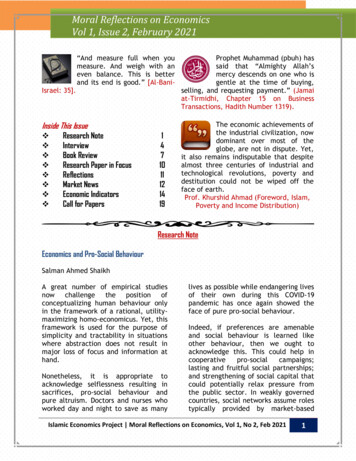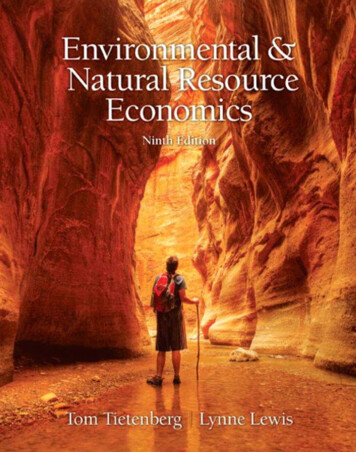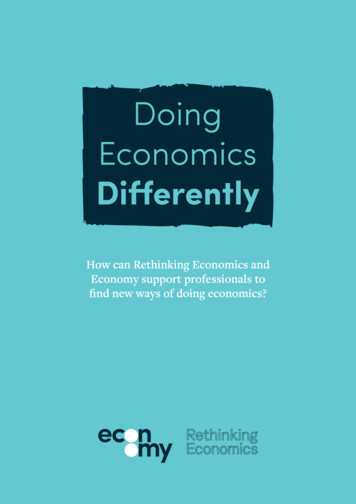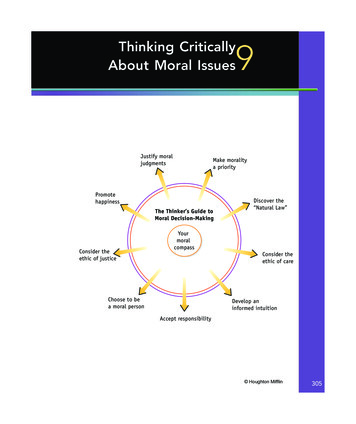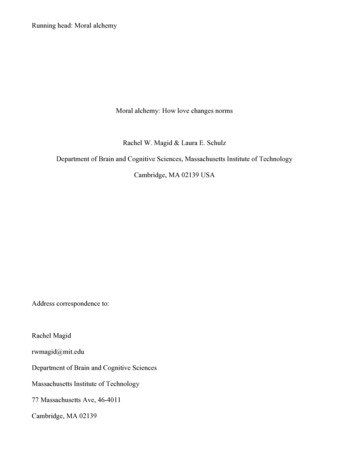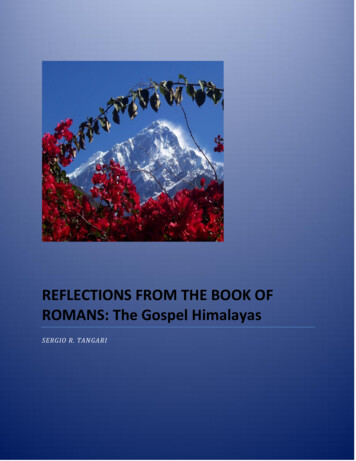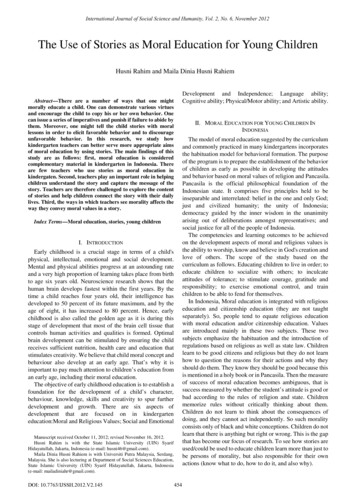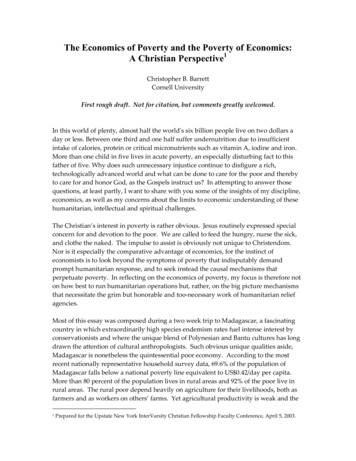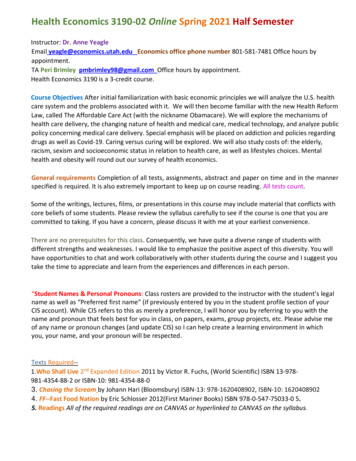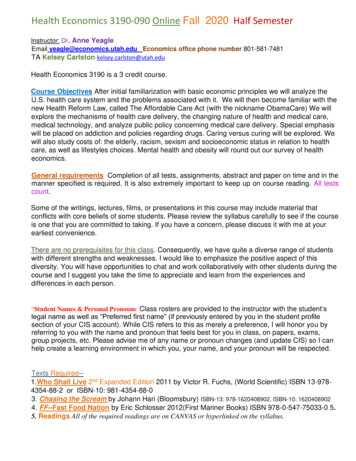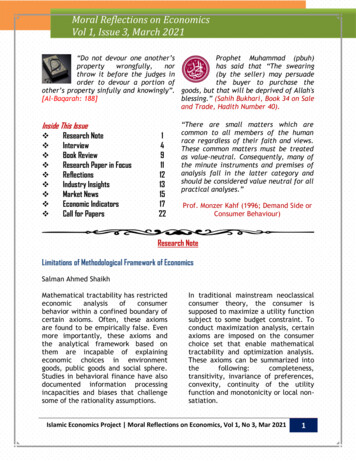
Transcription
Moral Reflections on EconomicsVol 1, Issue 3, March 2021“Do not devour one another’sProphet Muhammad (pbuh)propertywrongfully,norhas said that “The swearingthrow it before the judges in(by the seller) may persuadeorder to devour a portion ofthe buyer to purchase theother’s property sinfully and knowingly”. goods, but that will be deprived of Allah's[Al-Baqarah: 188]blessing.” (Sahih Bukhari, Book 34 on Saleand Trade, Hadith Number 40).Inside This Issue Research NoteInterviewBook ReviewResearch Paper in FocusReflectionsIndustry InsightsMarket NewsEconomic IndicatorsCall for Papers149111213151722“There are small matters which arecommon to all members of the humanrace regardless of their faith and views.These common matters must be treatedas value-neutral. Consequently, many ofthe minute instruments and premises ofanalysis fall in the latter category andshould be considered value neutral for allpractical analyses.”Prof. Monzer Kahf (1996; Demand Side orConsumer Behaviour)Research NoteLimitations of Methodological Framework of EconomicsSalman Ahmed ShaikhMathematical tractability has restrictedeconomicanalysisofconsumerbehavior within a confined boundary ofcertain axioms. Often, these axiomsare found to be empirically false. Evenmore importantly, these axioms andthe analytical framework based onthem are incapable of explainingeconomic choices in environmentgoods, public goods and social sphere.Studies in behavioral finance have alsodocumented information processingincapacities and biases that challengesome of the rationality assumptions.In traditional mainstream neoclassicalconsumer theory, the consumer issupposed to maximize a utility functionsubject to some budget constraint. Toconduct maximization analysis, certainaxioms are imposed on the consumerchoice set that enable mathematicaltractability and optimization analysis.These axioms can be summarized intothefollowing:completeness,transitivity, invariance of preferences,convexity, continuity of the utilityfunction and monotonicity or local nonsatiation.Islamic Economics Project Moral Reflections on Economics, Vol 1, No 3, Mar 20211
Apart from Economics, other socialsciences are not always thrilled torestrict consumer behavior analysiswithin such a framework which is onlyused for mathematical tractability ineconomics. Some economists defendthe neoclassical methods for analyzingconsumer behavior by arguing that thefalse assumptions are not potentreasons to abandon the mainstreammethods and analysis. It is theempirical validity of predictions withobserved behavior which gives themainstream tools and methodology‘credibility’ and wide ‘acceptability’.However, some opine that if consumerbehavior does not conform to the set ofaxioms adopted in neoclassical theory,then one cannot make the leap frommaximizing utility to constructingwelfare measures of consumer surplususing Hicksian or Marshallian demandcurves.Nobel laureate Richard Thaler explainsthat since mainstream consumerbehavior theory is based on a rationalmaximizing model, it describes howconsumers should choose given themodel and its assumptions; however,not necessarily describing how they dochoose. Mainstream consumer behaviortheory is normatively based and it onlyclaims that it is also a descriptivetheory.But, in many cases, the mainstreamconsumer theory fails to predict theeconomic choices either because ofrigid axioms or simplistic preferencestructure.Another Nobel Laureate Amartya Senexplaining the shortcomings in thestructure in neoclassicalcomments as follows:approach“A person is given one preferenceordering, and as and when theneed arises this is supposed toreflect his interests, represent hiswelfare, summarize his idea ofwhat should be done, and describehis actual choices and behavior.Can one preference ordering do allthese things? A person thusdescribed may be “rational” in thelimited sense of revealing noinconsistencies in his choicebehavior, but if he has no use forthese distinctions between quitedifferent concepts, he must be abit of a fool.”Some economists correctly argue thatmonotonicity axiom is irrelevant inenvironment goods where the balanceand coherence matters more thanabundance. Health goods also require abalance for their effectiveness. Same istrue when consumption is analyzedwith respect to health effects.Moreover, just like the consumerchoice implicitly maintains or shouldmaintain a balance with regards tohealth effects of consumption, themainstream consumer theory will bemuch better off by giving dueimportance to the balance with regardstoecology,biodiversityandintergenerational equity. This mayrequire incorporating the attribute of‘commitment’ in consumer theory, asemphasized by Amartya Sen.Using an example from social choice,Amartya Sen states that even whenindividualvotershavelimitedprobability of affecting actions andIslamic Economics Project Moral Reflections on Economics, Vol 1, No 3, Mar 20212
when the costs of casting votes couldbesubstantialinparticularcircumstances, people still take thepain to cast votes to document theirtrue preferences. Prof. Amartya Senargues that if this desire reflects asense of commitment, then thebehavior in question would be atvariance with the view of man intraditional economic theory.Furthermore, recent evidence inbehavioral finance and consumerpsychology points to the fact thatconsumerinformationprocessingcapabilities are limited and prone toerror. Alias paradox (1953) and Ellsbergparadox (1961) are good examples ofthis ��reflects the fact that people tend tolook at their choice outcomesrelatively.Prisoner’sDilemmahighlights the fact that choices by eachplayer in a self-centric way are notnecessarily going to be best for themeither individually or collectively.On the other hand, there is anothercritique on the rational consumertheory that it is overly optimistic aboutthe information processing capability ofthe consumer, as argued by HerbertSimon. He wrote:“The capacity of the human mindfor formulating and solvingcomplex problems is very smallcompared with the size of theproblemswhosesolution isrequired for objectively rationalbehavior in the real world — orevenforareasonableapproximation to such objectiverationality.”Sen, Amartya K. (1977), “A Critique ofthe Behavioral Foundations of EconomicTheory”, Philosophy and Public Affairs,6(4), pp. 317 – 344.Simon, Herbert (1957), “Models ofMan”, Wiley: New YorkThaler, Richard (1980), “Toward aPositive Theory of Consumer Choice”,Journal of Economic Behavior andOrganization, l, pp. 39 – 60.Allais, M. (1953), “Le comportement del’homme rationnel devant le risque:critique des postulats et axiomes del’école Américaine”. Econometrica, 21(4), pp. 503 – 546.Ellsberg,Daniel(1961),“Risk,Ambiguity, and the Savage Axioms”,Quarterly Journal of Economics, 75 (4),pp. 643–669.Islamic Economics Project Moral Reflections on Economics, Vol 1, No 3, Mar 20213
In Conversation with Thought Leaders in Islamic EconomicsProf. Muhammad Kabir Hassan is a Professor of Finance in theDepartment of Economics and Finance in the University ofNew Orleans. He currently holds three endowed positions ofChairs-Hibernia Professor of Economics and Finance, HancockWhitney Chair Professor in Business, and Bank One Professorin Business in the University of New Orleans. Professor Hassanis the winner of the 2016 Islamic Development Bank (IDB)Prize in Islamic Banking and Finance. Professor Hassan hasdone consulting work for the World Bank, International Monetary Fund, AfricanDevelopment Bank, Transparency International-Bangladesh (TIB), IslamicDevelopment Bank, United Nations Development Program (UNDP), Government ofTurkey and many private organizations. Professor Hassan has over 350 paperspublished as book chapters and in refereed academic journals. For his outstandingresearch and scholarly work, Prof. Dr. Hassan has been recognized withLifetime Achievement Award by UNO Research Council in 2019. We got anopportunity to get his insights on Islamic economics and finance and hope thatthese insights will introduce new ways of thinking for young economists and socialscientists aspiring to contribute in this field.Q1: Your educational background inUSA was in Economics and Finance.What made you interested in Islamiceconomics and Finance?I have not graduated from a religiousschool. But, as a Muslim, I got basiceducation about Islam in my nativecountry, Bangladesh. I migrated to USAat young age and completed myuniversity education over here. I goteducation in both economics andfinance. But, my interest was more ineconomics as it is a mother of all socialsciences and finance is only a part of it.I had this feeling that there should be aconnection and bridge between secularand spiritual or faith based approach tolooking at economics and economicissues. Living early years of my life in aMuslimmajoritycountrylikeBangladesh and then having migratedto USA, I got exposure to differentcultures and ways of looking at things.One of the first books that I read inIslamiceconomicsandfinanceliterature was by Prof. Abdul Mannan,who was one of the pioneer scholars inthe field from Bangladesh. I also gotthe chance to interact with Prof. Dr.MasudulAlamChowdhury,whoencouraged me to present a paper inPenang, Malaysia in one of theconferences.I was open to diverse readings. In fact,one of the serious readings that got meinterested in Islamic finance was byMervyn Lewis. So, I had a generalinterest in economics and finance andhad an early exposure to researchliterature in Islamic economics andfinance. When I joined University ofNew Orleans, fortunately, there was norestriction on what research interestsyou may pursue. So, despite of the factthat in my university of employment,there is no program on IslamicIslamic Economics Project Moral Reflections on Economics, Vol 1, No 3, Mar 20214
economics and finance, I was able topursue my research interest in Islamiceconomics and finance without anyhindrance.Q2: After four and half decades ofresearch in Islamic economics andFinance since mid-70s, what are thekey success stories and outstandingissues which need attention ofcurrent breed of researchers?corporate finance and proportionallevies and minimum exemption limits inpublic finance in the context of Zakat.In theoretical foundations, there isdifferentiationmadebetweenentrepreneurial capital that can earnrisk based profit and money capitalwhich cannot be compensated inintertemporal exchange without thetransformation of money capital tophysicalcapitaltogetherwithownership and risk transfers.Islamic economics has prescriptivefocus and a normative vision based onHowever, due to similar ways ofIslamic worldview. Just like economicsfinancial reporting and economicstarted with a political economystatistics, many of the datasets areorientation, Islamic economics alsosimilar and sometimes it becomes ablends philosophy,hindranceinculture,researchwhereAmong the success stories, we caninstitutionsandtherearelimitedsay that we have articulated ourissues of morality,andunsuitablevision well and are able to explainjustice,fairnessproxiesavailableIslamic worldview and teachingsand development.forIslamicrelated to economics and finance.precepts.Some have done it using the technicalAmong the successjargon of economics and throughstories, we can sayQ3:Onthethatwehavemethodologicalanalytical works employingarticulatedourfront,there aremathematics.vision well and arefew(ifany)able to explaindistinct analyticalIslamic worldview and teachingstools developed in Islamic economics.related to economics and finance.Empirical studies in Islamic FinanceSome have done it using the technicalcan very well be accommodatedjargon of economics and throughunder mainstream economics. Then,analyticalworksemployingis there a solid case of distinctmathematics. However, in terms ofanalytical economic field based onstatistical and empirical methods, weculture and faith alone?chiefly rely on mainstream economicstools.Some of the main currents inmethodology of Islamic economics inThere is some uniqueness in datasetscontemporaryliteratureinclude:with the inclusion of some newcircular economy approach, moralvariables, such as non-complianteconomyapproach,institutionalincome, dividend purification andapproach and pure transformativedifferentiation between interest freeapproach.and interest based leverage inIslamic Economics Project Moral Reflections on Economics, Vol 1, No 3, Mar 20215
Circular economy approach borrows theidea from mainstream economics thatresource utilization shall avoid wasteand ensure recycling for sustainability.In its vision and aims, it is not a novelconcept unique to Islamic economics,but some of the norms and institutionsforachievingcirculareconomyobjectives are unique in Islamiceconomics.direction and coordinated work. Aserious review of literature in theseapproaches to describe intellectual andanalytical progress will hardly be ableto find much from the past and presentliterature.All these approaches are neitherentirely correct nor incorrect. But, themajor lacking is in lack of vision,Ideally, we should develop productswhich are based on original Islamiccontracts rather than mimickingQ4: There are various viewpoints amiceconomics as juristic application ofMoral economy approach favors dualismIslamic precepts in financial markets.in policy and institutional design ofEarlierliteratureattempted toproducts and organizations whereby thepresent Islamic economics as a thirdmoral aspect is imbued with thealternativetoCapitalismandcommercial or economic aspects.Communism as an economic system orAgain, it is similar in vision to socialframework. Often, these viewpointseconomics to lay more or equalcome in apparent conflict where oneemphasis on issues of morality, fairnessfocuses on Shari'ah Compliance andand equity.the other focusesSome of the main currents inon excellence withmethodology of Islamic economicsTheinstitutionalregards to creatingincontemporaryliteratureinclude:approach takes asocioeconomiccircular economy approach, titutionalstance to developoriginal and distinctapproach and pure transformativeproductsandIslamic institutions.approach.structures to deliverAreboththoseproductsapproaches valid? Isthrough markets. Islamic banking andit time to give priority to onefinancial institutions have come aboutapproach over the other?by the efforts in that direction.It is indeed a valid concern. There shallThe pure transformative approachbe more coordination between thealmost disregards the notion ofShari’ah experts as well as the expertsdescriptive and positive analysis andin economics, finance, law, taxationlays complete focus on transformation.and marketing. Product development inFor making its case, it favors discardingIslamic finance has to ensure Shari’ahall theoretical edifices of mainstreamcompliance, but it is a necessary andneoclassical economics and adopts anot a sufficient condition for success.ratherpreaching styleway ofTheconcernsofsustainability,transformation of behaviour throughdistributive justice and equity areIslamic-founded education.equally important.Islamic Economics Project Moral Reflections on Economics, Vol 1, No 3, Mar 20216
conventional finance product byproduct. It is understandable thatcommercial financial institutions withsmaller size and meager market sharecannot be too flexible in a regulatoryenvironment which is tough and at bestneutral to Islamic finance. However,social finance is an important part ofoverall Islamic finance. There is needfor more focus and investment indeveloping social finance institutions sothat it can be shown that Islamicfinance caters to all and that all thetalk in Islamic economics aboutdistributive justice, social welfare andequity is not just lip service or wishfulthinking.special issues of top mainstreamjournals in recent years, there has beenvery limited research that can beconsidered as original and unique.Empirical papers take similar datasetsand explore a narrow set of researchquestions again and again. Even moreunfortunate is the quality of writingand compliance with academic norms,ethics and standards. We can work withsmall number of publications, butimportant point is that we have tocome up with research that isanalytical,rigorousandwhichcontributes new knowledge rather thanrepetition of same description orempirical analysis ofsame datasets overWecanworkwithsmallnumberQ5: In recent times,and over again.of publications, but importantspecial issues onIslamiceconomicspoint is that we have to comeQ6: Markets exist inand Finance werereal world both inup with research that ispublishedbyMuslimandnonanalytical, rigorous and whichmainstreamMuslimsocieties.contributes new knowledgeeconomicsandMainstreamrather than repetition of samefinancejournals.economics tries todescription or empiricalBut, yet it seemsunderstand economicanalysis of same datasets overthat we could notbehaviour of agentsdevelop and presentin markets using selfand over again.Islamic economics asinteresteda distinct economic field. Eitherframework. Some Muslim economistsnormative precepts are listed withouttreat self-interested behaviour asmathematical or empirical analysis orselfish pursuit. Some have anempirical analysis of performance ofaccommodativeattitudetowardsIFIs is done. Do you agree with thisthese tools for descriptive analysis ifconcern?adjustments are made in choice setandifnon-economicresourceThe quality of research has notallocation is kept outside the decisionsimultaneously improved unfortunatelychoice. What is your view on theseas much as is the proliferation oftwo attitudes towards economicvarious research journals. Earlier, itanalysis in the context of Islamiccould be said that Islamic economicseconomics?does not have access to high quality IvyLeague journals. But, despite havingI think we need to have more analyticalthe opportunity to publish Islamicstudies.Thereis emphasis oneconomics research exclusively intransformation of behaviour in IslamicIslamic Economics Project Moral Reflections on Economics, Vol 1, No 3, Mar 20217
economics, but it does not mean thatideal behaviour as we hypothesize orpreach about will always perfectlyreflect in reality. Therefore, we shouldavoid one-eyed focus on behaviour andchoice from the lens of self-interestedhomo economicus.integrated curriculum that caters tothis need. Right now, we have Madarsabased education which is producingShari’ah experts who are not equallywell versed in economics and finance.On the other hand, we have economicsandfinanceexpertswholackknowledge about Islamic sources ofAt the same time, we need to avoidknowledge or can only read thedogmatism and making an impression totranslated and derived literature. Untilthe objective and neutral reader thatsuch a curriculum is made, theIslamic economics is not more than aresearchers shall themselves try toliterature of saintly proverbs andengage in meticulous search ofidealism.knowledge, especially in the knowledgeareas which they didThere are pitfalls innot study formally.Therearepitfallsinmainstream economicsSecondly, there shallmainstream economics toolstools and methods. Webe strong and seriousshould be wary ofcollaboration betweenand methods. We should bethem, but also try toeconomistsandwary of them, but also try toplayourpartinreligious scholars soplay our part in improvingimproving them. Ourthat they complementthem. Our reluctance to usereluctancetousetheirstrengthsmathematics and empiricismmathematicsandsynergistically.shall not be absolute andempiricism shall not bebased on dogmatism alone.absolute and based onTo the researchers, Idogmatism alone. Wewill also advise that doWe can use mathematics andcan use mathematicsnot just go after quickempirics as language whereandempiricsasand easy ways ofappropriate and avoid propriate and avoidsubstantiveandthemmisfit.wheretheyQ7: As an accomplished researcherand author, what advice would yougive to young researchers who wantto pursue research in Islamiceconomics and finance currently?The young researchers need to takeeducation seriously. In contributing toIslamic economics and finance, theyshall be well grounded in economicsand finance as well as in Islamicknowledge. Ideally, we need ananalytical work willgive them better recognition in thelong term. Therefore, difficult topicswhich take time should not be avoidedin quest of publishing quickly. Thereare many outstanding issues whichrequireanalyticalresearch.Researchers shall not just poseempirical questions, but rather explainthe Islamic economics perspectivedeftly using mathematics, simulation,and experiments, where applicable.And I advise the young scholars to beperseverantandpatient!Islamic Economics Project Moral Reflections on Economics, Vol 1, No 3, Mar 20218
Book ReviewTitle:Ilm-ul-IqtisadAuthor:Allama Muhammad IqbalPublisher:Iqbal Academy PakistanAllama Iqbal’s first published book waswere compiled together. In most pageson economics. He wrote and publishedof the book, he explains the standardthis book in 1904.economic conceptsHe was not formallywith examples. InOvercoming poverty andtrainedasanthisreview,andeprivation will also depend oneconomist, but as aattempt is made tocollective morality and moralsocial thinker, hisfocus primarily onconsciousness in society. Policy andinterestliedinhis commentary andresources are not enough.social sciences asoriginal thoughts.Economists don't have the meanswell. He may haveto understand the origin of moralreadbooksonIn the beginning ofsense or the way morality in humaneconomicsandthe book, he sharedconsciousness can be transformed.attended lectures ona very profoundeconomics during histhoughtthatstay in England.overcoming poverty and deprivationwill also depend on collective moralityThis book of his is written in the styleand moral consciousness in society.of a textbook. However, in certainPolicy and resources are not enough.places, he shares his own views andEconomists do not have the means toalso applies the various concepts inunderstand the origin of moral sense oreconomics to the context of UnitedthewaymoralityinhumanIndia and explains the implications forconsciousness can be transformed.the economy of India.Before writing Wealth of Nations, AdamSince Iqbal is not an economist himself,SmithwroteTheoryofMoralhe uses the standard texts onSentiment. Allama Iqbal in his book alsoeconomics available then and borrowssuggests that economic choices andsome explanations from such texts. Hispolicy shall be well informed bystyle of writing is fluid. It seems thatmorality. Moral considerations shall besome parts were written to serve asprimary focus and aspiration for higherteaching notes and then later on, theyends shall emanate from moralIslamic Economics Project Moral Reflections on Economics, Vol 1, No 3, Mar 20219
worldview rather than narrow selfinterested view of homo economicus.observations about actual humanbehaviour and the cultural impacts onit is a better approach (inductiveapproach). Allama Iqbal shared his viewon that methodological choice andpreferred the second approach andcautionedagainstunnecessarysimplification of human behaviour as itmay lead to false analysis andprediction.Allama Iqbal recognizes that wealth orvaluable resources include both humancapital (innate and acquired skills) aswell as social capital (trustworthinessand cooperation). In economic growthliterature, 'Resource drag' is a termused to signify the fact that havingnatural resources alone is not sufficientfor long term growth. It is important toHe also shared the view that economicsutilize them effectively and whichshall remain concerned with economicrequires investment in physical as wellchoices. Choices under compulsionas human capital. This insight is part of(compulsory military service) and loverather recent economic literature in(sacrifice of mother) shall not bethe last quarter of 20th century.discussed in economics, unlike the viewAllama Iqbal alsoof Gary Becker whoemphasized on thisfavoured a broaderEconomics shall remainpoint in his bookground for economicsconcerned with economic choices.which was written into cover. Iqbal’s viewChoices under compulsionearly years of 20thisconducivefor(compulsory military service) andcentury.allowingbothlove (sacrifice of mother) shallpositive analysis ofnot be discussed in economics,Indiscussionofeconomic behaviourunlike the view of Gary Beckerepistemologyandand yet leaves amethodologyofspace for influence ofwho favoured a broader groundanalysisinotherstimulants,for economics to cover.economics,asuch as morality,perennial question isvalues,spiritualitythat whether imposing normative viewand culture without focusing on everytaking into account one trait of humanaspect of human behaviour and choicepsychology (selfishness) in consumerwithin the self-interested framework.behaviour (deductive approach)abetter approach or should broad basedIslamic Economics Project Moral Reflections on Economics, Vol 1, No 3, Mar 202110
Research Paper in FocusPaper Title: Expanding the Frontiers of Economics: Some Insights from the Qur’anicRevelationAuthor:Prof. Muhammad Akram KhanPublisher: Turkish Journal of Islamic Economics, 6(1), 1 – 34.The noted author is one of the pioneercontributors in the field of Islamiceconomics. He has written onmethodology of Islamic economics fromtime to time. He is an objective thinkerwho had made critical evaluation ofboth mainstream economics as well asIslamic economics on some aspects.Inprinciple,hewantsIslamiceconomics to be an analytical field. Heexpects that mainstream economicsshall avoid bias against religion andshould not undermine and disregardknowledge that comes from religioustexts. Some knowledge that comesfrom religious sources dates back tocenturies. However, such knowledge isstill applicable today. Instead ofarriving at same conclusions andreinventing the wheel, it is not unwiseto pay heed toward the knowledge thatemanates from religion.He gave examples of knowledge onwhich there is now almost universalconsensus and that such knowledge waspart of religious texts since a long timeago, such as consensus on equality ofhuman beings, accountability for all,respect for property rights, womenrights, safety net for the poor,documentation of business dealings,government’s responsibility toward thegoverned, restraint on economicpower,andgovernancethroughconsultation, for instance.Indeed, such knowledge sponsibility,moderation, kindness and cooperationnot only can influence behaviour, butalso gives spiritual fulfillment andcontentment as virtuous actions arepromised deterministic rewards in lifehereafter in the Islamic worldview.Theauthorcriticallyevaluates‘Happiness Reports’ and shows thatmany of the critical aspects of humanhappiness are covered in Islamicsourcesofknowledge.Religiousknowledge, if practiced and observed,can help in achieving Falah both in thislife and hereafter. Adding the spiritualdimension can further help in focusingonbroaderaspectsofhumanpersonality. Despite material affluence,many developed countries still havethousands of people suffering fromdepression,anxiety,personalitydisorders and which lead to hundreds ofpeople committing suicide despitehaving material affluence.The concept of moderation, avoidingwaste, responsible use of resource andconsidering oneself as custodian andsteward of material resources ratherthan an ultimate owner who canconsume resources at whatever rateand ways, are also critical aspects thatcan change and transform habitsIslamic Economics Project Moral Reflections on Economics, Vol 1, No 3, Mar 202111
towards a more responsiblecooperative lifestyle.andSocialism was a very enticing andattractive philosophy to achieve equityand reduce injustices and classconflicts. However, getting rid ofprivate incentives in a faithlessgovernance framework is a weak modelto ensure that the ruling class does notbecome the new oppressors. It alsoundermines innovation, creativity andexertionofeffortsinseekingknowledge and creating knowledge.Capitalism, on the other hand, providesincentivesforinnovationandcreativity, but it is unable to ensurebroader access to capital from whichbasic necessities are to be met andinvestment is to be carried out inenterprisesandhumancapitaldevelopment. Interest on moneycapital allows capitalists to not onlypreserve their wealth, but also getincrease in it continuously without anyregards to the productivity of thatcapital.In this regard, religious knowledgewhich bans interest and introduces abroad based wealth tax, is conduciveforencouraginginvestmentandcirculation of wealth while reducingunemployment and wealth inequality.This paper is a good articulation by theauthor to introduce the economiccontribution that religious knowledgecan bring in terms of rules of behaviourand institutions which undermine andregulate the negative aspects in humanpersonality and elicit positive andproductive decisions.ReflectionsIf an economy has 10 million people,then should the food be produced anddistributed to the markets for all 10million people? Many people wouldanswer yes. It is because food is a basicnecessity and everyone should be ableto fulfill basic necessities.However, markets serve demand andnot needs. Markets serve productswhich are demanded. Demand inmarket economy is a desired quantityof goods and services for which there ispurchasing power. A layperson mayexpect and wish that if a tradeoff is tobe made between making luxury resortsand producing food to feed the hungrypeople, then the latter choice will bepreferred. But the investment decisionsare not analyzed like that in marketeconomy. If marginal revenue productis higher in producing luxuries than inproducing necessities, investment willflow to the production of luxuries.Thus, s
Islamic economics has prescriptive focus and a normative vision based on Islamic worldview. Just like economics started with a political economy orientation, Islamic economics also blends philosophy, culture, institutions and issues of morality, justice, fairness and development. Among the
